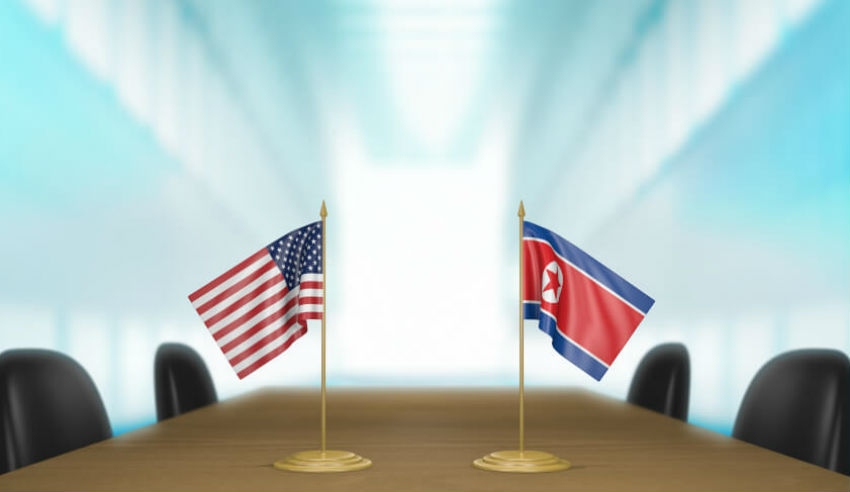The diplomacy on display at this week’s Singapore meeting between Donald Trump and North Korea’s Kim Jong-un could hint hope for future nuclear disarmament but human rights advocates are drawing attention to the plight of people who have suffered crimes against humanity under the ruling DPKR regime.

When North Korea revealed that it had the nuclear missile capacity to reach the mainland of the United States, experts observed that negotiating a way through the tension would sit delicately between crises and break though.
Bearing in mind the “brinksmanship, belligerence or bombast” both US president Donald Trump and Chairman Kim Jong-un of the Democratic People’s Republic of Korea (DPRK) were capable of, Mr Graham warned that the outcome of the summit would have the potential to redefine Asia’s geopolitics.
Now that meeting has happened, the risk of an all-out war has lessened but North Korea has taken no steps towards disarming. A joint statement signed by both leaders has also been widely critiqued as an empty document filled only with diplomatic platitudes. The statement speaks of establishing new US-DPRK relations, efforts to build a "lasting and stable peace regime", and working towards the complete denuclearisation of the Korean Peninsula.
Speaking to Lawyers Weekly ahead of the Trump-Kim summit, former High Court judge Michael Kirby AC CMG said that he did not believe global peace and security could be guaranteed by nuclear disarmament alone.
“I think it is important that we don’t put the issues of human rights under the carpet and forget about it, and just look at the geopolitical issues,” Mr Kirby said.
Last year a report published by the International Bar Association called on the international community to vest in the International Criminal Court (ICC) or special tribunal the power to investigate crimes against humanity committed in North Korea.
The IBA said that a total of 10 out of 11 crimes which there was evidence for could be directly linked to Chairman Kim Jong-un under the established legal doctrine of command responsibility. These included the crimes of murder, extermination, enslavement, forcible transfer, imprisonment, torture, sexual violence, persecution, enforced disappearances and other inhumane acts.
While Mr Kirby welcomed dialogue with North Korea, he described the human rights record in North Korea as “grim”. The right response was to hold those responsible for these horrendous crimes against humanity, he said.
“Of course, it is difficult to secure accountability for crimes against humanity, whilst at the same time seeking North Korea’s renunciation of their nuclear weapons, which at least arguably may have been developed in order to avoid accountability for the crimes against humanity that have been found. But the two go together,” Mr Kirby said.
“We’ll just have to see whether or not Mr Trump can pull of a deal which both protects the peace and security of the world, which is itself a human rights issue, but also protects the human rights of the people of North Korea,” he said.
Mr Kirby co-chairs the IBA’s Human Rights Institute and led a commission of inquiry on North Korea that was established by the United Nations Human Rights Council. The resulting 2014 report found regime-wide human rights abuses pertaining to the right to food, those associated with prison camps, torture and inhuman treatment, arbitrary detention, discrimination, freedom of expression, the right to life, freedom of movement, and enforced disappearances, including in the form of abductions of nationals of other states.
“The temptation will be to ignore [the human rights issues] in the hope that a deal can be got with nuclear non-proliferation,” Mr Kirby said.
According to Human Rights Watch deputy director for Asia, Phil Robertson, more than 100,000 North Koreans are currently in detention in mountain gulags. In his view, the outcome of the Trump-Kim summit was to effectively tell North Korea that human rights were not a priority for the US.
“For North Koreans, this means continued public executions, restrictions on movement, brutally punishing three generations of a family when one member “offends,” and an absolute prohibition on any civil and political rights, on top of inadequate access to food, housing, education, and health care,” Mr Robertson said.
“Let’s not forget that the things which got Kim Jong Un a seat opposite Donald Trump – his ballistic missiles and nuclear weapons program – are only made possible by Pyongyang using forced labor and diverting scarce resources from food to the military. This is what makes Kim Jong Un’s system tick. The North Korean people know that, so why couldn’t Trump figure it out?”
Mr Kirby pointed to the preamble of the United Nations Charter of 1945, which made clear that the attainment and protection of universal human rights were a priority for the world post WWII.
The retired judge also observed that it was incumbent on citizens of democratic nations, such as Australia, to bring to the attention of political leaders that the human rights of North Koreans mattered.
“I believe there will be no peace and security on the Korean peninsula until the great injustices that are inflicted on the people of North Korea, as revealed in the report of the Commission of Inquiry, are cured and that those who are responsible are brought to justice,” Mr Kirby said.
The joint statement which came out of this week's summit said that the US Secretary of State, Mike Pompeo, would meet with a high level North Korean official to establish the new "US-DPRK relations".